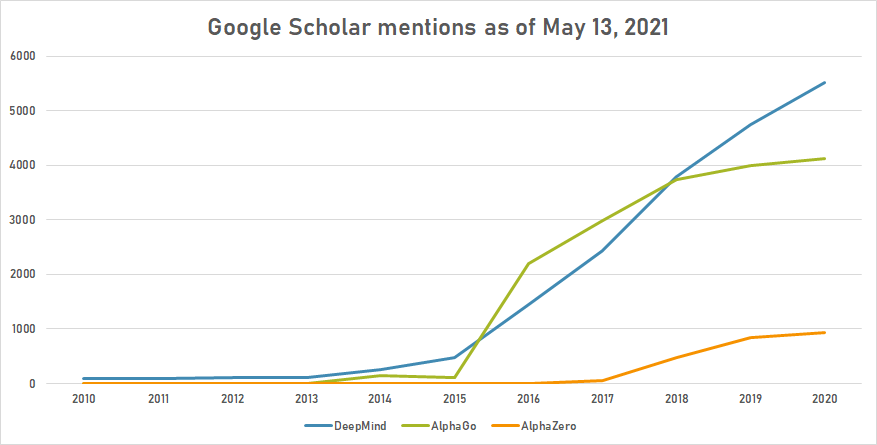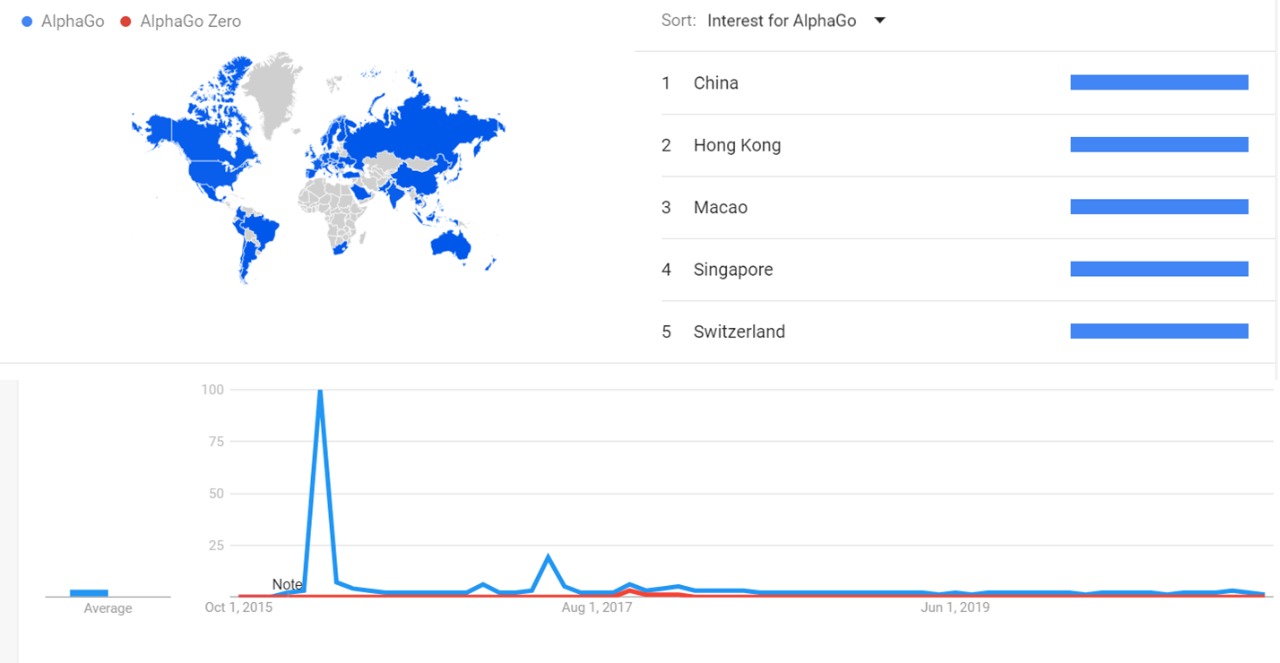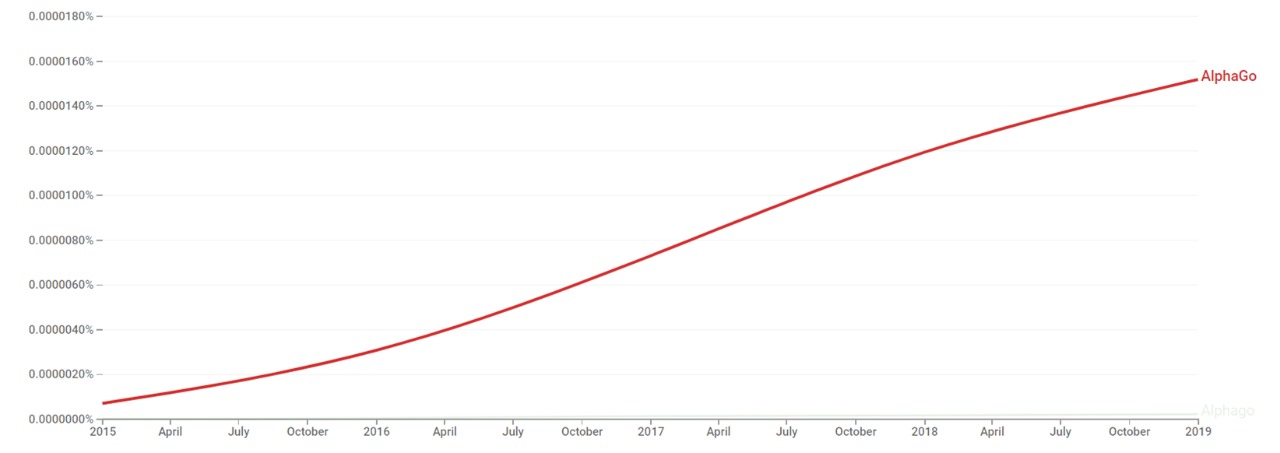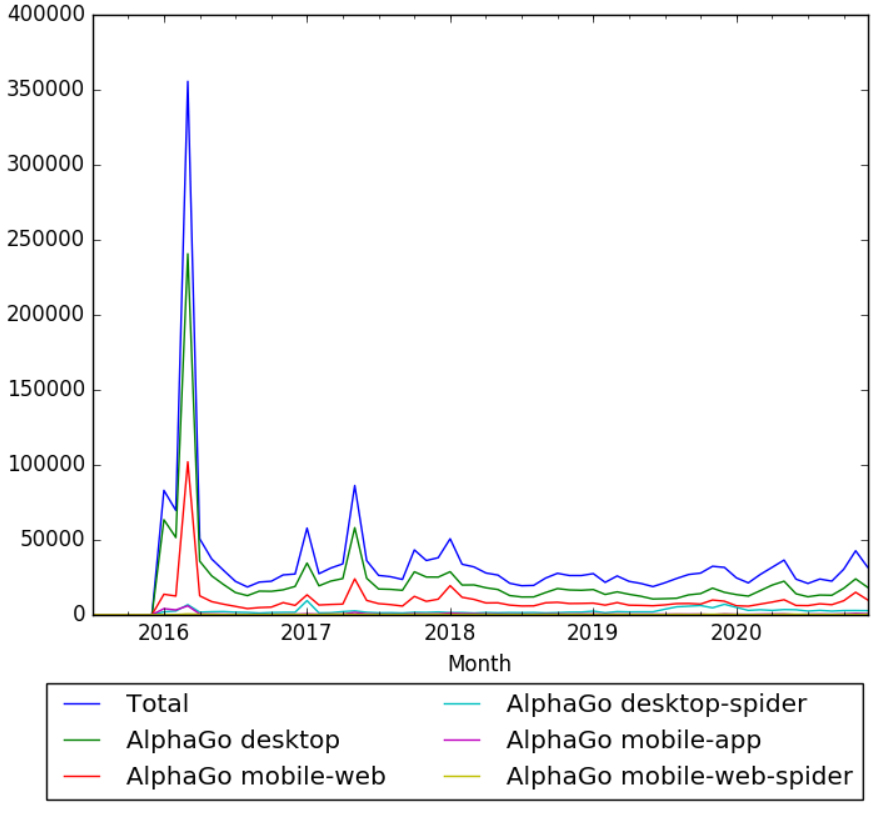Difference between revisions of "Timeline of AlphaGo"
From Timelines
(→Visual data) |
|||
| (16 intermediate revisions by the same user not shown) | |||
| Line 14: | Line 14: | ||
|} | |} | ||
| − | |||
| − | |||
| − | |||
| − | |||
| − | |||
| − | |||
| − | |||
| − | |||
| − | |||
==Full timeline== | ==Full timeline== | ||
| Line 102: | Line 93: | ||
|- | |- | ||
|} | |} | ||
| + | |||
| + | == Numerical and visual data == | ||
| + | |||
| + | === Mentions on Google Scholar === | ||
| + | |||
| + | The following table summarizes per-year mentions on Google Scholar as of May 13, 2021. | ||
| + | |||
| + | {| class="sortable wikitable" | ||
| + | ! Year | ||
| + | ! DeepMind | ||
| + | ! AlphaGo | ||
| + | ! AlphaZero | ||
| + | |- | ||
| + | | 2010 || 97 || 0 || 0 | ||
| + | |- | ||
| + | | 2011 || 83 || 0 || 0 | ||
| + | |- | ||
| + | | 2012 || 109 || 0 || 0 | ||
| + | |- | ||
| + | | 2013 || 111 || 0 || 0 | ||
| + | |- | ||
| + | | 2014 || 251 || 135 || 0 | ||
| + | |- | ||
| + | | 2015 || 479 || 111 || 0 | ||
| + | |- | ||
| + | | 2016 || 1,450 || 2,190 || 0 | ||
| + | |- | ||
| + | | 2017 || 2,430 || 2,980 || 56 | ||
| + | |- | ||
| + | | 2018 || 3,800 || 3,730 || 480 | ||
| + | |- | ||
| + | | 2019 || 4,740 || 4,000 || 833 | ||
| + | |- | ||
| + | | 2020 || 5,520 || 4,120 || 937 | ||
| + | |- | ||
| + | |} | ||
| + | |||
| + | [[File:AlphaZero google sch.png|thumb|center|700px]] | ||
| + | |||
| + | === Google trends === | ||
| + | |||
| + | The comparative chart below shows Google trends data for AlphaGo (computer program) and AlphaGo Zero from October 2015 to January 2021, when the screenshot was taken.<ref>{{cite web |title=AlphaGo |url=https://trends.google.com/trends/explore?date=2015-10-01%202021-01-06&q=%2Fg%2F11c3w4kywq,%2Fg%2F11f1jww7v6 |website=trends.google.com |access-date=6 January 2021}}</ref> | ||
| + | |||
| + | [[File:AlphaGo gtrends.jpeg|thumb|center|700px]] | ||
| + | |||
| + | === Google Ngram Viewer === | ||
| + | The chart below shows {{w|Google Ngram Viewer}} data for {{w|AlphaGo}}, from 2015 to 2019.<ref>{{cite web |title=AlphaGo |url=https://books.google.com/ngrams/graph?content=AlphaGo+&year_start=2015&year_end=2019&corpus=26&smoothing=1&case_insensitive=true |website=books.google.com |access-date=13 January 2021}}</ref> | ||
| + | |||
| + | [[File:AlphaGo ngram.jpeg|thumb|center|700px]] | ||
| + | |||
| + | === Wikipedia Views === | ||
| + | |||
| + | The chart below shows pageviews of the English Wikipedia article {{w|AlpgaGo}}, created in January 2016.<ref>{{cite web |title=Wikipedia Views: results |url=https://wikipediaviews.org/displayviewsformultiplemonths.php?page=AlphaGo&allmonths=allmonths-api&language=en&drilldown=all |website=wikipediaviews.org |access-date=25 January 2021}}</ref> | ||
| + | |||
| + | [[File:Alphago wv.png|thumb|center|500px]] | ||
==Meta information on the timeline== | ==Meta information on the timeline== | ||
Latest revision as of 18:01, 9 June 2023
This is a timeline of AlphaGo, a computer program developed by DeepMind that plays the board game Go.
Contents
Big picture
| Time period | Development summary |
|---|---|
| 2014 | The AlphaGo research project is formed. |
| Since 2015 | AlphaGo starts defeating human professional Go players. Earlier, computers were only known to have played Go at the “amateur” level.[1] |
| 2016 | AlphaGo victory in March becomes a major milestone in artificial intelligence research,[2] with Go having being previously been regarded as a hard problem in machine learning expected to be out of reach for the technology of the time.[2][3][4] |
Full timeline
| Year | Month and date | Event type | Details |
|---|---|---|---|
| 3000 BP | Prelude | The game of Go originates in China. The rules of the game are simple: players take turns to place black or white stones on a board, trying to capture the opponent's stones or surround empty space to make points of territory.[5] | |
| 1997 | May | Prelude | IBM's computer Deep Blue beats world chess champion Garry Kasparov.[6] |
| 2010 | Prelude | DeepMind is founded to create general-purpose artificial intelligence that can learn on its own.[7] | |
| 2012 | March | Prelude | Software program Zen, running on a four PC cluster, beats Japanese 9p professional Masaki Takemiya two times at five and four stones handicap.[8] |
| 2013 | March | Prelude | Software Crazy Stone beats Japanese Go professional Yoshio Ishida (9p) at four-stones handicap.[9] |
| 2014 | Founding | The AlphaGo research project is formed to test how well a neural network using deep learning can compete at Go.[10] | |
| 2015 | October | Achievement | AlphaGo versus Fan Hui is held at DeepMind's headquarters in London.[11] The distributed version of AlphaGo defeates the European Go champion Fan Hui, a 2-dan (out of 9 dan possible) professional, five to zero.[12][13][12][14] This is the first time a computer Go program beats a professional human player on a full-sized board without handicap.[15] |
| 2015 | October | Achievement | The original AlphaGo becomes the first computer Go program to beat a human professional Go player without handicaps on a full-sized 19×19 board.[16][12] |
| 2015 | October | Game series release | Fan Hui versus AlphaGo game play is released in version 13. It consists of five games.[5] |
| 2016 | January 28 | Research | AlphaGo's team publishes an article in the journal Nature, describing the technical details behind the reinforcement learning approach used in AlphaGo.[17] |
| 2016 | February | Game series release | AlphaGo versus AlphaGo is released in version 18. It consists of three games.[5] |
| 2016 | March | Achievement | AlphaGo versus Lee Sedol takes place as a five-game Go match between 18-time world champion Lee Sedol and AlphaGo. Played in Seoul, South Korea between 9 and 15 March 2016, AlphaGo wins all but the fourth game.[18] This is the first time a computer Go program beats a 9-dan professional without handicaps.[19][20][21][22] The match is watched by over 200 million people worldwide.[23] |
| 2016 | March | Game series release | Lee Sedol versus AlphaGo game play is released on version 18. It consists of five games.[5] |
| 2016 | May | Hardware development | Google unveils its own proprietary hardware "tensor processing units". The company states having already deployed this hardware in multiple internal projects, including the AlphaGo match against Lee Sedol.[24][25] |
| 2016 | October 12 | Research | DeepMind publishes a paper on differentiable neural computers, which demonstrates that models that can simultaneously learn like neural networks as well as memorize data like computers.[26][27] |
| 2016 | December | Game series release | AlphaGo Online Series on Tygem and Fox game play is released on AlphaGo Master version. It consists of sixty games.[5] |
| 2017 | January | Achievement | Under the pseudonym "Master", AlphaGo plays several of the world's top players in a series of online matches, winning all 60 of its completed contests.[28][29][5] |
| 2017 | May | International meeting | The Future of Go Summit is held by the Chinese Go Association, Sport Bureau of Zhejiang Province and Google in Wuzhen, Zhejiang, the permanent host of the World Internet Conference. It features five Go games involving AlphaGo and top Chinese Go players,[30] as well as a forum on the future of artificial intelligence.[31][23][5] |
| 2017 | May | Game series release | Future of Go Summit game play is released on AlphaGo Master version. It consists of five games.[5] |
| 2017 | May | Game series release | AlphaGo versus AlphaGo Batch 1 to 5 game plays are released on AlphaGo Master version. Each series consisis of ten games.[5] |
| 2017 | May 24 | Achievement | AlphaGo defeats Chinese Go world champion Ke Jie in a second, decisive win of a three-part series taking place in China.[32][33] |
| 2017 | July | Game series release | WeiQi TV-5 Extra Games game play is released on AlphaGo Master version. It consists of five games.[5] |
| 2017 | September 29 | The AlphaGo documentary film is released.[34] | |
| 2017 | October 19 | Research | AlphaGo's team publishes an article in the journal Nature, introducing AlphaGo Zero, a version created without using data from human games, and stronger than any previous version.[35][5] |
| 2017 | October 20 | Recognition | The DeepMind team behind AlphaGo is awarded the inaugural Marvin Minsky Medal by the International Joint Conference On Artificial Intelligence (IJCAI) in Stockholm, for outstanding achievements in the field of AI.[36][37][38][39] |
| 2017 | October 25 | Software release | Leela Zero, a free and open-source computer Go software, is released. It is developed by Belgian programmer Gian-Carlo Pascutto,[40][41][42] the author of chess engine Sjeng and Go engine Leela.[43][44] |
| 2017 | October | It is announced that AlphaGo Zero, armed with just the rules, has in 40 days become even better at Go than the original AlphaGo, without the help of game records.[22] | |
| 2017 | October | Game series release | AlphaGo Zero (20 Blocks) vs AlphaGo Lee game play is released on AlphaGo Zero version. It consists of twenty games.[5] |
| 2017 | October | Game series release | AlphaGo Zero vs AlphaGo Zero - 20 Blocks game play is released on AlphaGo Zero version. It consists of twenty games.[5] |
| 2017 | October | Game series release | AlphaGo Zero vs AlphaGo Zero - 40 Blocks game play is released on AlphaGo Zero version. It consists of twenty games.[5] |
| 2017 | October | Game series release | AlphaGo Zero (40 Blocks) vs AlphaGo Master game play is released in AlphaGo Zero version. It consists of twenty games.[5] |
| 2017 | December 5 | Software release | The DeepMind team releases a preprint on arXiv, introducing AlphaZero, a program using generalized AlphaGo Zero's approach, which achieved within 24 hours a superhuman level of play in chess, shogi, and Go, defeating world-champion programs, Stockfish, Elmo, and 3-day version of AlphaGo Zero in each case.[45] |
| 2017 | December | Software release | DeepMind releases the AlphaGo teaching tool on its website,[46] to analyze winning rates of different Go openings as calculated by AlphaGo Master.[47] The teaching tool collects 6,000 Go openings from 230,000 human games each analyzed with 10,000,000 simulations by AlphaGo Master. Many of the openings include human move suggestions.[47][5] |
| 2017 | December | Achievement | AlphaZero beats the 3-day version of AlphaGo Zero by winning 60 games to 40, and with 8 hours of training it outperformes AlphaGo Lee on an Elo scale. AlphaZero also defeats a top chess program (Stockfish) and a top Shōgi program (Elmo).[45] |
| 2018 | April | Research | A paper published in Nature cites AlphaGo's approach as the basis for a new means of computing potential pharmaceutical drug molecules.[48][49] |
| 2018 | December | Upgrade | A paper is published in Science describing AlphaZero, a new version having been able to teach itself to play three different board games (chess, Go, and shogi) in just three days, with no human intervention.[50][51][52][53] |
Numerical and visual data
Mentions on Google Scholar
The following table summarizes per-year mentions on Google Scholar as of May 13, 2021.
| Year | DeepMind | AlphaGo | AlphaZero |
|---|---|---|---|
| 2010 | 97 | 0 | 0 |
| 2011 | 83 | 0 | 0 |
| 2012 | 109 | 0 | 0 |
| 2013 | 111 | 0 | 0 |
| 2014 | 251 | 135 | 0 |
| 2015 | 479 | 111 | 0 |
| 2016 | 1,450 | 2,190 | 0 |
| 2017 | 2,430 | 2,980 | 56 |
| 2018 | 3,800 | 3,730 | 480 |
| 2019 | 4,740 | 4,000 | 833 |
| 2020 | 5,520 | 4,120 | 937 |
Google trends
The comparative chart below shows Google trends data for AlphaGo (computer program) and AlphaGo Zero from October 2015 to January 2021, when the screenshot was taken.[54]
Google Ngram Viewer
The chart below shows Google Ngram Viewer data for AlphaGo, from 2015 to 2019.[55]
Wikipedia Views
The chart below shows pageviews of the English Wikipedia article AlpgaGo, created in January 2016.[56]
Meta information on the timeline
How the timeline was built
The initial version of the timeline was written by User:Sebastian.
Funding information for this timeline is available.
Feedback and comments
Feedback for the timeline can be provided at the following places:
- FIXME
What the timeline is still missing
Timeline update strategy
See also
External links
References
- ↑ "Why DeepMind AlphaGo Zero is a game changer for AI research". hub.packtpub.com. Retrieved 5 June 2019.
- ↑ 2.0 2.1 Steven Borowiec; Tracey Lien (12 March 2016). "AlphaGo beats human Go champ in milestone for artificial intelligence". Los Angeles Times. Retrieved 13 March 2016.
- ↑ Connor, Steve (27 January 2016). "A computer has beaten a professional at the world's most complex board game". The Independent. Retrieved 21 May 2019.
- ↑ "Google's AI beats human champion at Go". CBC News. 27 January 2016. Retrieved 21 May 2019.
- ↑ 5.00 5.01 5.02 5.03 5.04 5.05 5.06 5.07 5.08 5.09 5.10 5.11 5.12 5.13 5.14 5.15 "AlphaGo's Games". alphago-games.com. Retrieved 21 May 2019.
- ↑ "Deep Blue, IBM's supercomputer, defeats chess champion Garry Kasparov in 1997". nydailynews.com. Retrieved 6 June 2019.
- ↑ "What we learned in Seoul with AlphaGo". blog.google. Retrieved 21 May 2019.
- ↑ "Zen computer Go program beats Takemiya Masaki with just 4 stones!". Go Game Guru. Archived from the original on 1 February 2016. Retrieved 28 January 2016.
- ↑ "「アマ六段の力。天才かも」囲碁棋士、コンピューターに敗れる 初の公式戦". MSN Sankei News. Archived from the original on 24 March 2013. Retrieved 27 March 2013.
- ↑ Ciaburro, Giuseppe. Keras Reinforcement Learning Projects: 9 projects exploring popular reinforcement learning techniques to build self-learning agents.
- ↑ Metz, Cade (27 January 2016). "In Major AI Breakthrough, Google System Secretly Beats Top Player at the Ancient Game of Go". WIRED. Retrieved 1 February 2016.
- ↑ 12.0 12.1 12.2 "Google achieves AI 'breakthrough' by beating Go champion". BBC News. 27 January 2016.
- ↑ "Special Computer Go insert covering the AlphaGo v Fan Hui match" (PDF). British Go Journal. 2017. Retrieved 1 February 2016.
- ↑ "Special Computer Go insert covering the AlphaGo v Fan Hui match" (PDF). British Go Journal. Retrieved 1 February 2016.
- ↑ "Première défaite d'un professionnel du go contre une intelligence artificielle". Le Monde (in français). 27 January 2016.
- ↑ "Research Blog: AlphaGo: Mastering the ancient game of Go with Machine Learning". Google Research Blog. 27 January 2016.
- ↑ "The story of AlphaGo so far". deepmind.com. Retrieved 23 May 2019.
- ↑ "Artificial intelligence: Go master Lee Se-dol wins against AlphaGo program". BBC News Online. 13 March 2016. Retrieved 13 March 2016.
- ↑ "Match 1 – Google DeepMind Challenge Match: Lee Sedol vs AlphaGo". 8 March 2016.
- ↑ "DeepMind's AlphaGo Zero Becomes Go Champion Without Human Input". futureoflife.org. Retrieved 5 April 2019.
- ↑ "AI: How big a deal is Google's latest AlphaGo breakthrough?". techrepublic.com. Retrieved 5 April 2019.
- ↑ 22.0 22.1 "AlphaGo". britgo.org. Retrieved 5 April 2019.
- ↑ 23.0 23.1 "AlphaGo China | DeepMind". DeepMind. Retrieved 21 May 2019.
- ↑ McMillan, Robert (18 May 2016). "Google Isn't Playing Games With New Chip". Wall Street Journal. Retrieved 21 May 2019.
- ↑ Jouppi, Norm (May 18, 2016). "Google supercharges machine learning tasks with TPU custom chip". Google Cloud Platform Blog. Retrieved 21 May 2019.
- ↑ "DeepMind's work in 2016: a round-up". deepmind.com. Retrieved 23 May 2019.
- ↑ Graves, Alex; Wayne, Greg; Reynolds, Malcolm; Harley, Tim; Danihelka, Ivo; Grabska-Barwińska, Agnieszka; Gómez Colmenarejo, Sergio; Grefenstette, Edward; Ramalho, Tiago; Agapiou, John; Puigdomènech Badia, Adrià; Moritz Hermann, Karl; Zwols, Yori; Ostrovski, Georg; Cain, Adam; King, Helen; Summerfield, Christopher; Blunsom, Phil; Kavukcuoglu, Koray; Hassabis, Demis. "Hybrid computing using a neural network with dynamic external memory". Nature. Retrieved 23 May 2019.
- ↑ "AN IMPROVED ALPHAGO WINS ITS FIRST GAME AGAINST THE WORLD'S TOP GO PLAYER". wired.com. Retrieved 5 April 2019.
- ↑ "DeepMind's AI beats world's best Go player in latest face-off". newscientist.com. Retrieved 5 April 2019.
- ↑ "Exploring the mysteries of Go with AlphaGo and China's top players". DeepMind. 10 April 2017. Retrieved 21 May 2019.
- ↑ "DeepMind's AlphaGo is back..and this time it's taking on five humans at once". Wired.com. 10 April 2017. Retrieved 21 May 2019.
- ↑ Russell, Jon. "Google's AlphaGo AI wins three-match series against the world's best Go player". techcrunch.com. Retrieved 31 May 2019.
- ↑ "Google AI defeats human Go champion". bbc.com. Retrieved 31 May 2019.
- ↑ "AlphaGo (2017)". Rotten Tomatoes. Retrieved 23 May 2019.
- ↑ Silver, David; Schrittwieser, Julian; Simonyan, Karen; Antonoglou, Ioannis; Huang, Aja; Guez, Arthur; Hubert, Thomas; Baker, Lucas; Lai, Matthew; Bolton, Adrian; Chen, Yutian; Lillicrap, Timothy; Fan, Hui; Sifre, Laurent; Driessche, George van den; Graepel, Thore; Hassabis, Demis (19 October 2017). "Mastering the game of Go without human knowledge". Nature. 550 (7676): 354–359. ISSN 0028-0836. PMID 29052630. doi:10.1038/nature24270. Retrieved 10 December 2017.
- ↑ Gorey, Colm. "DeepMind team behind AlphaGo wins inaugural 'Nobel Prize for AI'". siliconrepublic.com. Retrieved 1 June 2019.
- ↑ "DeepMind team behind AlphaGo wins inaugural 'Nobel Prize for AI'". lionra.ie. Retrieved 1 June 2019.
- ↑ "IJCAI 2018 Kicks Off; DeepMind AlphaGo Wins Marvin Minsky Medal". medium.com. Retrieved 1 June 2019.
- ↑ "DeepMind wins the Minsky medal for AlphaGo". celi.it. Retrieved 1 June 2019.
- ↑ "Feature: One man's Go program looks to remake AlphaGo Zero - and beyond". Xinhuanet. 9 April 2018. Retrieved 5 April 2019.
- ↑ "围棋AI"丽拉"获赞接近职业棋手水准,它的作者竟是一个不太会下棋的程序员" (in 中文). Xinhuanet. 5 February 2018. Retrieved 5 April 2019.
- ↑ "更开放,更共享,比利时围棋AI"丽拉·元"重塑"阿尔法元"" (in 中文). Xinhuanet. 8 April 2018. Retrieved 5 April 2019.
- ↑ "프로 수준급 인공지능 바둑 프로그램 '릴라(Leela)' 무료 공개" (in Korean). Baduk News. 23 February 2017. Retrieved 5 April 2019.
- ↑ "릴라의 출현과 온라인 대국의 비극적인 종말..." (in Korean). Cyberoro. 3 March 2017. Retrieved 5 April 2019.
- ↑ 45.0 45.1 Silver, David; Hubert, Thomas; Schrittwieser, Julian; Antonoglou, Ioannis; Lai, Matthew; Guez, Arthur; Lanctot, Marc; Sifre, Laurent; Kumaran, Dharshan; Graepel, Thore; Lillicrap, Timothy; Simonyan, Karen; Hassabis, Demis (5 December 2017). "Mastering Chess and Shogi by Self-Play with a General Reinforcement Learning Algorithm".
- ↑ "AlphaGo teaching tool". DeepMind.
- ↑ 47.0 47.1 "AlphaGo教学工具上线 樊麾:使用Master版本" (in Chinese). Sina.com.cn. 11 December 2017. Retrieved 11 December 2017.
- ↑ "Go and make some drugs The Engineer". www.theengineer.co.uk. Retrieved 21 May 2019.
- ↑ Segler, Marwin H. S.; Preuss, Mike; Waller, Mark P. "Planning chemical syntheses with deep neural networks and symbolic AI".
- ↑ Silver, David; Hubert, Thomas; Schrittwieser, Julian; Antonoglou, Ioannis; Lai, Matthew; Guez, Arthur; Lanctot, Marc. "A general reinforcement learning algorithm that masters chess, shogi, and Go through self-play".
- ↑ "Move over AlphaGo: AlphaZero taught itself to play three different games". arstechnica.com. Retrieved 5 June 2019.
- ↑ Yirka, Bob. "AlphaZero AI system able to teach itself how to play games, play at highest levels". techxplore.com. Retrieved 5 June 2019.
- ↑ "Google's New AI Is a Master of Games, but How Does It Compare to the Human Mind?". smithsonianmag.com. Retrieved 5 June 2019.
- ↑ "AlphaGo". trends.google.com. Retrieved 6 January 2021.
- ↑ "AlphaGo". books.google.com. Retrieved 13 January 2021.
- ↑ "Wikipedia Views: results". wikipediaviews.org. Retrieved 25 January 2021.



